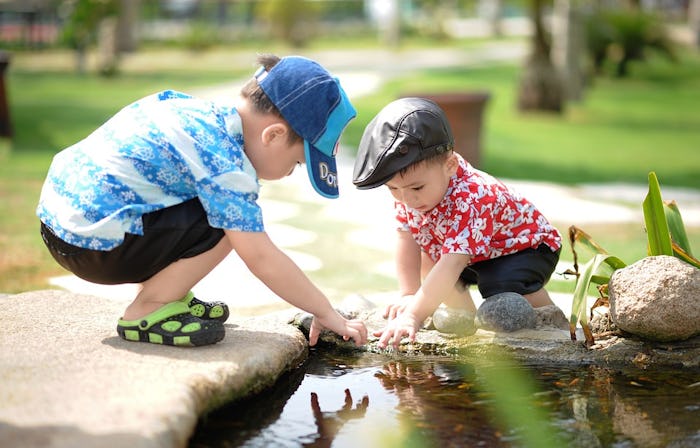Life
9 Signs Your Child Is Finding Their Independence, Not Ignoring You
Some say you're born with it, others think it can be taught. But it may be a little bit of each of these ingredients that make a person independent. If you're trying to spot this quality in your child, you may have to look beyond surface level to see how your child is developing her independence. At first glance, it might seem like she is not interested in your company, but more is going on. Noticing the signs your child is finding their independence — not ignoring you — takes some awareness to recognize. But once you see how much this benefits your kiddo, you'll be happy she's going her own thing.
In order to encourage independence in your child, you must be willing to step back. Less interference with problem solving is a good place to start. Your child is capable of more than your realize, and making her own sandwich is one way she is showing you that. It's not that she doesn't love the way you spread the jelly, it's just her way of figuring out how to be more self-sufficient.
Being able to confidently move through the day with minimal help from a parent is a strong characteristic for a child to possess. Consider it a good thing if you see any of these nine signs of independence in your child.
1They Are Invested In An Activity
If your child is dedicated and invested in an activity, sport, or hobby, consider that a good sign. According to Psychology Today, children who are intrinsically motivated are more independent because they have found something they feel connected to, and strive to achieve without parental incentives.
2They Explore On Their Own
The bungee cord between you and your child should be able to stretch farther and farther as they grow. Even kids as young as two can start to show signs of independence, as Parenting magazine pointed out. Being about to leave your side and explore on their own is a building block of independence.
3They Express Their Observations
Kids notice everything, and they usually have no problem calling it like they see it. Although this may sound like it could get a tad embarrassing, it's actually a healthy expression of their independence. According to Psych Central, freedom to express thoughts and observations is a sign that you have fostered independence in your child. When kids are able to trust their perception of the world around them, it builds their confidence.
4They Thrive Around Others
Ever notice how much better your child behaves for teachers, babysitters, and grandparents? There's a reason for that, and it comes down to independence. As Parents magazine reported, independent kids tend to thrive when their parents are not around. Usually this happens because parents have laid the groundwork for their kid to feel independent, but it also because they are capable of handling more than their parents may believe.
5They Don't Need Rescuing
It can be natural to want to solve problems for your child, especially when they're little. But sometimes they can do it themselves with a few verbal cues. As the website for Dr. Sears pointed out, independent kids solve problems on their own. They don't need mom and dad to come do it for them; they either take a small direction from you or figure it out by themselves.
6They Find Opportunities To Try
Even though more milk ends up on the counter than in the bowl when my son makes his own cereal, at least he's trying tasks to do on his own. According to Today's Parent, attempting tasks on their own, is a sign your child is gaining independence. Kids are able to do many things on their own, even though sometimes they still ask you to do those things for them.
7They Come To You With Ideas
Creating a collaborative environment in your home will set your child up for success. When a child brings ideas to their parents, it shows they are independent thinkers and doers, according to Psychology Today.
8They Ask To Stay Home
Although this probably won't start to happen until your kids are older, asking to stay home alone is a positive event. As Parenting pointed out, around 10-years-old, independent kids will ask to stay home alone. As long as they are able to follow directions and respect safety rules, this can be a good time to start allowing them to flex their independence muscles.
9They Push Back A Little
Often when children push back against adults, the grown ups can go on the defensive. However, this behavior can have some merits. Within the context of healthy limits, kids naturally push for independence, which isn’t rebelliousness and should be encouraged, according to Pysch Central.
